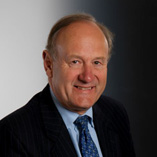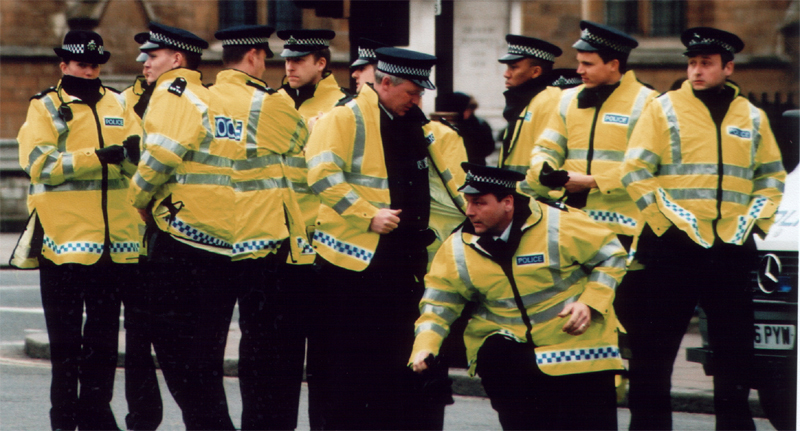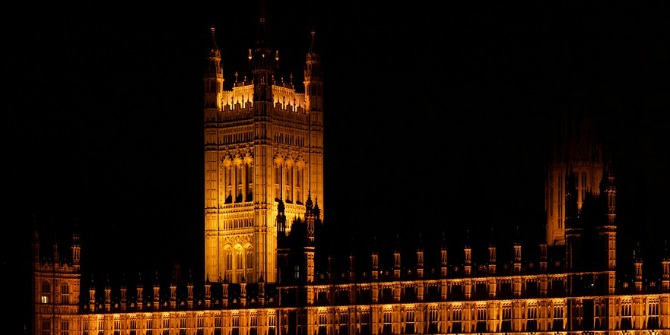
 Lord Stevens and Jennifer Brown were respectively chair and deputy chair of the Independent Commission into Policing. Here, they comment on the role played by police culture in the Hillsborough disaster and in other failed investigations, offering some thoughts on how to rebuild trust and confidence after such tragedies.
Lord Stevens and Jennifer Brown were respectively chair and deputy chair of the Independent Commission into Policing. Here, they comment on the role played by police culture in the Hillsborough disaster and in other failed investigations, offering some thoughts on how to rebuild trust and confidence after such tragedies.
The death of 96 Liverpool football fans and injury to over 700 others at Hillsborough in 1989 was not only a terrible tragedy but also a scandal. The recent verdict of unlawful killing ranks high amongst the litany of high-profile cases besetting the police service, including the child sexual exploitation cases in Rotherham, also a failure of the South Yorkshire Police. Compounding the operational shortcomings were the lies and attempts to conceal botched investigations: in her review, Professor Alexis Jay found that three reports had previously alerted the police to child victims in Rotherham. The first of these was effectively suppressed because senior officers did not believe the data it contained, and the other two were ignored, leading to Jay’s suggestions of “cover-up”.
The Drew review on Rotherham also pinpointed “a lack of professional curiosity” prevailing amongst senior ranks with little value being attached to the concerns of grassroots officers. In his parliamentary statement following the Hillsborough verdict Andy Burnham also used the term cover-up as the force tried to establish that others were responsible for the opening of the gate in the Hillsborough stadium. All these statements and reports cited “culture” as part of the explanation for these catastrophic deficiencies.
‘Cop Culture’
So what do we understand about the police occupational culture and how do we address its desperately serious consequences? We considered these questions when chairing the Independent Police Commission, whose findings were published in 2013. Alongside the report was a companion set of academic papers which provided some insights into police culture and together enabled the Commission to propose some curatives to its adverse effects. A workplace culture provides people with a frame of reference about what behaviour is expected, informal rules about who you can talk to, what you can (and cannot) ask: a road map of how things are done. Culture provides language, slang, jokes and coping strategies. At its heart lies a set of assumptions, often so embedded they are simply taken for granted: truisms such as those complaining of sexual exploitation were not to be believed because they were precociously promiscuous.
Robert Reiner describes ‘cop culture’ as giving police a sense of mission i.e. policing is not just a job but a way of life. It has the characteristics of a sect, initiating belonging and excluding those who are ‘other’. Culture also imbues a degree of suspiciousness – looking out for signs of trouble – as well as conferring high levels of machismo which is a product of the male domination in forces, their access to the use of force, and the anticipatory ‘fun’ to be had through high speed chases and a representation of policing as action-oriented.
There is also a strong sense of internal solidarity coupled with a degree of external isolation – an ‘us against them’ mentality. This leads to heavy reliance on loyalty to colleagues and a protective amour shielding the force as a whole from public knowledge of wrong-doing. As Reiner says, this can result in presentational strategies being adopted by some senior officers to protect the reputation of their force. This is not to damn all staff. Again as Reiner is at pains to distinguish, there are ‘wise officers’ who, whilst committed to vocational aspects of the culture, they balance the need to exert authority and control with legitimacy; but there are also ‘hardnosed cops’ who bend or break rules through cynicism and disillusionment.
Trust in the police
At its best, this culture can be caring and heroic. At worst it can be discriminatory and dishonest. It is the case that the police still enjoy a good deal of public confidence. IPSOS-Mori has tracked trust in professions since 1983 and over two thirds of those polled consistently indicate they trust the police to tell the truth. However the Commission report found that trust falls away the greater the engagement a member of the public actually had with the police.
Policing by consent – the bedrock of the British policing model – requires the police to demonstrate they are deserving of the public’s trust, because it is through such approval that they gain their legitimacy. Why else would or should the public co-operate with the police? When police do get things so badly wrong, as in the Hillsborough case, the effects are very damaging to public confidence and erode trust. The Commission recommended the need to accelerate the work of building police into a profession. This is based on two essential processes: procedural justice and evidence-based practice.
Procedural justice
Procedural justice demands that decisions are made in a neutral and unbiased way, that people are treated with dignity and respect and being accorded their proper rights, and the giving of ‘voice’ to people meaning that their needs are taken into account and efforts are made to find out what these are through consultation. These conditions equally apply to relationships within the police organisation itself. Both the Jay and Drew reviews indicated that front line staff did not have a voice. Indeed there was a willful ignorance exerted by senior officers (as predicted from Reiner’s analysis).
The Commission’s survey of police officers measured how procedurally just their own forces were. It found a direct relation between the number of complaints made by the public of oppressive police behaviour, and the degree to which the force operated in a procedurally just fashion. So better treatment internally modelled external behaviour. But we also discovered that those forces low on procedural justice actually had higher levels of performance as measured by crime detections. It seemed to the Commission that a single-minded focus on building a reputation for performance was won at the neglect of a more people-oriented approach. When officers believed their own forces did the right thing and were free of corruption, they were much more likely to believe that the public received fairer treatment.
Evidence-based practice
Evidence based policing is using the best available research blended with police’s own experience and judgement to inform policies and practices. An evidence-based policing movement is discernable in the United States, Australia and Canada. The establishment of the College of Policing in the UK is actively promoting such an approach but, as noted by Betsy Stanko, there has been a ‘neotribal resistance’ to research-based evidence by some police. Building a police profession along these lines offers “an antidote” to corruption and poor performance.
The College of Policing has already been working with some forces to show the benefits of working within a model of procedural justice. The Home Office’s innovation fund has recently awarded a grant to a consortium led by Professors Stanko and Mike Hough to “infuse” principles of evidence based policing and procedural justice into police training. The Commission recommended the creation of a chartered police professional accountable through an ethical code of conduct and a transparent disciplinary process.
Police officers deemed to have been grossly incompetent and/or to have committed serious misconduct should be struck of a publically available professional register and inhibited from serving again. There needs to be a shift from training which re-enforces this is the way we do things round here to certified educational qualifications which give officers and staff confidence to question their seniors on the one hand and to be able to translate the evidence into practice on the other.
We recognise that such reforms will take time, but in the light of the seriousness of the failings arising from Hillsborough and other operational failures there is a greater urgency to implement our recommendations.
 Lord Stevens of Kirkwhelpington was Commissioner of the Met from 2000 until 2005. He has chaired several high profile enquiries looking at corrupt practice.
Lord Stevens of Kirkwhelpington was Commissioner of the Met from 2000 until 2005. He has chaired several high profile enquiries looking at corrupt practice.
 Professor Jennifer Brown is Co-Director of the Mannheim Centre for Criminology, Department of Social Policy at the London School of Economics. She has recently edited the books Forensic Psychology (2014) and The Future of Policing (2014) and with colleagues she published Forensic psychology: theory, research, policy and practice.
Professor Jennifer Brown is Co-Director of the Mannheim Centre for Criminology, Department of Social Policy at the London School of Economics. She has recently edited the books Forensic Psychology (2014) and The Future of Policing (2014) and with colleagues she published Forensic psychology: theory, research, policy and practice.









Read the rather long post above. Just to correct a few errors which point to the notion that the writer is a ‘freeman fighter’.
I will freely admit I work for one of the 43 forces, have a Hons Degree in Politics and Economics.
None of the other 42 forces will say anything externally whilst an investigation is underway. This is not indicative of anything else. Justice for the 96 is still ongoing as of July 2018.
It is not to say that it is not discussed internally. This tragedy, cover ups, and ongoing lack of honesty/integrity to admit failings remains the darkest period in UK policing.
The sad thing is I can see how it went down and how the need to self preserve by the higher ranks and the government could in theory happen again. It wrestles with the notion of whistle blowing whilst wearing the T-shirt that says ‘disciplined organisation’. Truthfully I feel that the ability to speak out is limited, a few brave souls like myself would and have on much lesser concerns.That is a cultural problem.
The notion of Queen and country is a myth. The monarch is a figure head used by the state (Government). And in the brackets you have the answer. The police are an arm of the State that seek to maintain the status quo. That status quo being a Capitalist Democracy. Bringing the notion of the monarch and Magna Carta (are you American?) deflects from a good argument you have made.
For the large part UK police still police by consent. Consider the effects that use of force has had in the USA ref Black shootings and Cop killings. When consent breaks down we have riots in the UK. Crucially only an extreme minority participate before the status quo, a capitalist status quo resumes.
Your last paragraph calls for a Written Constitution. As I mentioned above the USA has the Magna Carta in the American Bar Association Statue, influenced heavily in the US constitution etc. Yet the US Police can hardly be held up as policing with consent. Speaking to American cops they are amazed at the way we police and the lack of firearms and use of force.
I could go on but as mentioned you have a few good and bad points raised.
#noarmingukpolice
#justiceforthe96
“At worst it can be discriminatory and dishonest”? Really? At its worst? So move along now, nothing to see here chaps.
Many senior & chief officers have been required to evidence ‘professional curiosity’. They are groomed for senior rank and many see learning how to investigate crime as unnecessary – look at the national detection rates to illustrate the point. The Home Office set targets and Chief Officers work to achive them – which is why safeguarding children was seen as a priority until the scandals are revealed. Policing lacks leaders who understand the job.
The core problem with UK “Cop Culture” is that it nurtures the imperial relationship between the Crown and the people. There is a fundamental inequality that the police sustain and defend by institutional design. They are there to protect the Queen *first* then maintain public order. Their role is more regime stability, maintain law and order, rather than enforce the law. They swear their first oath to the Queen. They do not swear it to the law, the people, or Parliament. Indeed, their origin is from the UK’s colonial past and their early ethos, which has become implicit, is that they are an occupying or colonial force.
The deeper problem is the UK regime, which is founded in inequality. The myth of policing by consent is pernicious. It is a pious fraud at best. It is impossible to have policing by consent in a regime where you are not ruled by consent. No one can elect the next monarchy. No one consented to the current monarch. To ignore or elide this issue means one simply avoids reality.
The South Yorkshire Police did not act any differently from any other police force at that time. Readers will note that not a single police force has condemned the SYP. Despite 27 years of denials, even though officers knew the truth was being suppressed *and* they suppressed the truth, they did not speak up. They put their reputation first, the law second, and the victims last. Think about that for a moment. The police force as a whole knew this, participated in it, and did nothing about it. They lived this lie, promoted this lie, and defended this lie. Yet, we are told we must trust the police.
The police have yet to step up and say “We have a toxic culture and we are going to change it.” instead, they rely on good publicity through television programmes, positive news stories, and the active, robust, and determined suppression of dissent, criticism, or challenge. This is not a “rogue” event. This is a way of life across all forces. The blue silence is the deeper problem as it shows that claims to “fairness” “Justice” and “service” are simply platitudes or conveniences that only work when they do not require the police to admit their flaws, faults, or where they have gotten wrong. Instead, they have constantly referred, like an automatic response or defensive reflex on “”rogue” officer defence”. Every error is always a “rogue” officer and never a rogue culture. Why?
The demand for “good press” has fostered this as the police have done more on media management than ensuring they reform their culture. They would rather manage the appearance, by courting the press, than by managing the reality. Until the reality is managed as the appearance that organisations, not simply individuals, recognize they have a deep systemic problem, these problems will continue if only in a different form. Like the murder of David Oluwale, it did not lead to fundamental reform. Instead, it taught the police that if they are to do anything, make sure the person is in custody so their are less witnesses and greater plausible deniability. Consider since that event 1500 people have died in police custody and not a single officer has been convicted in any of those deaths.
So long as the police, the government, and the people deal with the symptoms there will be no change, no reform, and no justice. The deeper problems have to be addressed. The question is though do the police, the government, and the public have the courage to confront the deeper issue and reform the regime? Since Magna Carta the UK has been struggling with the abuse of power and yet it has never addressed, except for a brief interlude, the core problem remains. Until our political analysis understands this point and works from it, which seems implicit in questions such as whether the UK needs a written constitution, the policing culture will remain as a symptom not a cause.